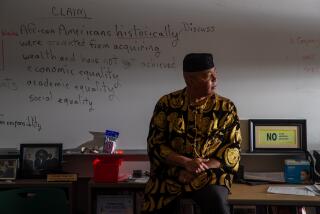‘Don’t you see? He gave what money can’t buy. Time. Himself.’ : The Last Days of a Decent Man
- Share via
You could say of Russ Singleton that he was a foolish man who tried to buy friendship with gold bracelets and hard cash and you’d be right. You could also say of him that he was a sweet and caring man who gave to others for the simple beauty that giving provided and you would be right in that instance also.
He was, as we all are, a dichotomy of motives and emotions, which would make him by most standards an ordinary man. He was a brick mason who had come by money through no device of wit or talent, but rather through inheritance, a means to prosperity that offers small credit to its beneficiary.
Yet, there was a quality at work in his life that deserves mention here, if for no other reason than the sorrow his death has created on Community Street.
Singleton was 36 when he was killed instantly on April 4 in an automobile accident at a nowhere intersection in Northridge, a mile and a half from his home.
He was the only passenger in a car driven by a friend when it collided with another car. Later, healing in a hospital, the friend said: “Russ did everything for everybody. I don’t do anything for anybody. Why was he the one to die?”
The comment caught my attention and I found myself exploring not so much the caprice of selective mortality as the feeling that generated the question in the first place.
Who was Russ Singleton and why is he mourned on Community Street?
I found some answers through a man named Bernie Kowalski, who lives across the way from the plain, brick-and-stucco house that had been Singleton’s home for 25 years.
Kowalski had known Russ for all of those years, from the time he was a kid who played on the quiet, tree-shaded lane in an almost rural setting through age 26 when he suddenly inherited a lot of money from a father he had not seen since he was 2.
It was when the money came, Kowalski feels, that a different kind of Russ Singleton began to emerge.
“He was always a giving person,” Kowalski said, “but now he had cash, a fat lump sum and then maybe $100,000 a year. He was proud of it and wanted to share it with everyone.
“I told him to get a business manager, to get the money out of his hands, because I knew he’d give it away, and that’s exactly what he did.
“Russ would make loans, and when we’d warn him he would never get the money back, he’d smile and say, ‘They’re my friends,’ as if that were the only explanation he ever needed.
“He gave $125,000 to a guy named Tom to start a business and, when the business went belly-up in a couple of years, he gave him money to start another business. ‘Russ,’ I said, ‘for God’s sake why?’ You know what his answer was? ‘No one works harder than Tom. He just had a little bad luck.’ ”
Singleton was a bachelor and lived alone, but his house was open to every kid on the block. He even made sure his furniture was strong enough to support them so they could climb on it without hurting themselves.
“Russ loved to give parties,” Kowalski said, “both at his house and in restaurants. What was unique about them was they were always family parties. He wanted the kids to be there.”
Singleton gave more than money, Kowalski remembers. He gave hope to people he hardly knew and, in some cases, free room and board and even an allowance until they got back on their feet.
“An example of his giving beyond cash,” Kowalski said, “was a gift of expensive golf clubs Russ gave to a boy in the neighborhood. Any guy with money can buy golf clubs and give them away, but Russell went a step further. He took the boy to the golf course and taught him how to use the clubs.
“Don’t you see? He gave what money can’t buy. Time. Himself . “
Singleton wasn’t pure. He used cocaine up until a year and a half before he died and gave it up only because friends in the neighborhood cared so much about him and gave him no peace until he stopped snorting.
They remember Russ walking in a dream state down Community Street with an old dog named Luke he had saved from the pound and they warned him that if he didn’t leave coke alone it would kill him.
Singleton valued his friends and lived for what he could do for them tomorrow, so he stopped snorting, just like that. As it turned out, the number of tomorrows was limited anyhow. All the plans died at that intersection.
A hundred or so friends attended the wake and heard a preacher talk about Singleton as though he were a saint, and then Kowalski spoke.
“The Russell I knew was loud and dopey and crazy and fun,” he said. “He was a man who in many ways never grew up, but he possessed a great wisdom.
“He knew that the true gift of life was to give love without expecting anything in return.”
I crossed the street and stood in front of Singleton’s house. There were yellow seals from the county administrator’s office on each door. A wheelbarrow was turned up against a wall. A shovel lay near a hole half-dug.
I stood there for a very long time.
More to Read
Sign up for Essential California
The most important California stories and recommendations in your inbox every morning.
You may occasionally receive promotional content from the Los Angeles Times.













